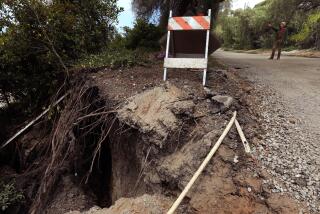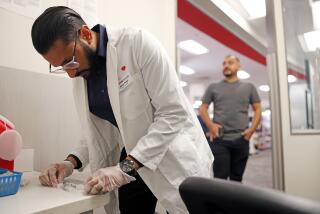Child Sex Abuse Cases Pose Dilemma for Prosecutors : Law: Lack of evidence and witnesses mean charges are seldom filed. But the accusations can leave a stigma.
Although reports of child sexual abuse have risen dramatically in recent years, there are such formidable hurdles to investigation and prosecution that some experts have labeled it the perfect crime. Yet even when authorities are unable to prosecute, the stigma of being linked to so abhorrent an act can be impossible to erase.
That dichotomy is at the heart of allegations that pop megastar Michael Jackson molested a 13-year-old boy.
The Jackson controversy is unique because it involves a high-voltage celebrity known worldwide. But, according to experts who have declined to comment specifically on the Jackson matter, the case poses a classic legal dilemma for investigators.
“There rarely is physical evidence and there rarely is an eyewitness in these cases,” making the search for truth difficult, said McGeorge University law professor John E.B. Myers, who recently completed a two-volume treatise on child abuse law.
“If it’s a drug case, you usually have the cocaine. If there is a bank robbery, there is stolen cash. Here, it’s almost always the credibility of a kid versus a grown-up.”
In this instance, Jackson’s alleged victim has told investigators for the Department of Children’s Services and the Los Angeles Police Department that the singer lured him into passionate kisses, masturbation and oral sex. So far, no eyewitnesses have come forward and no physical evidence of sexual molestation has been found, according to sources, although other adolescents have said they slept in the same bed with Jackson.
The singer has categorically denied the abuse charges. Jackson’s representatives have contended that the 35-year-old singer is the victim of a $20-million extortion plot engineered by the 13-year-old boy’s father.
The allegations against Jackson come during a period in which reports of child abuse and neglect have soared. It is a trend that prompted a U.S. Department of Health and Human Services task force in 1990 to declare the problem a national emergency.
The number is up, in part, because of laws that make reporting of suspected incidents mandatory for many professionals, including doctors and social workers. But some experts say there are still hundreds of thousands of incidents that go unreported.
Last year, the reported incidents rose to 2.9 million, up from 1 million a decade ago. An overwhelming number involved accusations of neglect, such as failing to feed or clothe a child, which rarely lead to criminal charges.
About 580,000 of the 2.9 million reports were allegations of sexual abuse, also a marked increase from prior years, although experts say it is difficult to get precise figures.
For a variety of reasons, including insufficient evidence and unwilling child witnesses, less than 10% of those lead to criminal charges, according to academic studies.
In California, the law on sexual abuse of children states that any person who “willfully and lewdly commits any lewd or lascivious acts” with a child under age the 14 of is guilty of a felony. To be convicted, the perpetrator must be shown to have touched the victim.
Another statute, dealing with parental neglect, makes it a crime for someone to permit a child to be placed in a situation that will endanger his or her life or health.
Although the statutes are relatively simple, proving such cases is another matter. The easiest are those in which there are eyewitnesses, medical evidence, an admission by the perpetrator, multiple victims or a combination of those.
But many cases are so-called “one on ones”--a child accusing an adult of molestation with no other witness. In such instances, the child’s credibility is the critical issue in a prosecutor’s determination of whether to file criminal charges.
Because children, particularly those under age 7, can have difficulty recalling the specifics usually needed for a successful case, prosecutors say there are additional tests that must be passed before they will file criminal charges.
“You look at all the surrounding circumstances,” said Jane A. Blissert, assistant chief deputy district attorney for sex crimes in Los Angeles County. These include whether the child has a motive to fabricate, she said.
Among the factors used to judge a child’s credibility, said Sgt. Tom Circle, a child abuse investigator for the Los Angeles County Sheriff’s Department, are the amount of detail in the child’s story, consistency of those details, recollection of dates or time of year when the alleged incidents took place and whether the child uses “age appropriate” language. “If a kid says ‘pedophilia,’ he’s probably been coached,” the investigator said.
Circle added that he listens to whether the child describes the incident from a participant’s point of view: “How did it feel. If they said semen was ‘sticky’ to the touch, that helps validate what they are saying.” He said it is important to ask the child whether the alleged perpetrator told him to keep everything secret (considered typical in abuse cases) and to ask about the progression of sexual activity:
“A lot of the time, abusers set up the situation, first tickling, then they begin sharing a bed with the child, then baths, then washing the child, then putting a hand on the child’s private parts, from less intrusive to more intrusive.”
Prosecutors say it is especially important to closely scrutinize molestation allegations arising in the context of a divorce or custody dispute. Research has indicated that many more false accusations arise in these situations than at other times.
After assessing these and other factors, a district attorney has to decide whether the case is strong enough to make a conviction likely. “Deciding not to file criminal charges in a child abuse case may be more difficult than the decision to file,” according to a manual issued by the Alexandria, Va.-based National Center for the Prosecution of Child Abuse. “Many cases involve situations in which the prosecutor or others believe abuse has occurred, but criminal charges cannot be filed because of insufficient admissible evidence, unavailability of necessary witnesses” or other factors.
Because of the stringent standards used to assess these cases, about 85% of those that are filed lead to guilty pleas or convictions, roughly the same percentage as other crimes, according to Patricia Toth, the center’s legal director.
But in a number of instances, cases are dropped because parents or guardians fear multiple interviews with different government agencies and the prospect of testifying in court would be too damaging to the children, said Aileen Adams, attorney for the Santa Monica Rape Treatment Center. Such dissatisfaction with how children are treated when they come forward with allegations has prompted government and the courts to take a variety of steps--some of them controversial.
“The law has evolved to acknowledge that children can’t be treated the same as adults,” said Blissert of the Los Angeles district attorney’s office. “They don’t talk the same way. They don’t think the same way. They don’t understand the same way.”
And many children find the prospect of testifying against their tormentor frightening.
In Los Angeles County and elsewhere, district attorney’s offices have created special sex abuse teams to add firepower to investigations. In Santa Monica, Stuart House was established in 1988 as the nation’s first child abuse treatment program to jointly house medical, law enforcement and child protection services to aid prosecutions and reduce victims’ trauma.
On the legal front, at least 25 states have passed laws permitting children to testify on closed circuit television without appearing in court. In 1990, the U.S. Supreme Court rejected contentions that such procedures violate defendants’ constitutional right to confront their accusers.
California is among the states with such a law, but there are so many restrictions that it is rarely used, said Myers of McGeorge University. Many states, including California, also permit a support person to stand next to the alleged victim who is testifying.
California has taken other steps, as well. Independent corroboration is not required in this state to prove a child abuse allegation.
Moreover, California voters in 1990 approved a measure expanding the use of hearsay in preliminary hearings. The ability to present such testimony--for example a social worker describing what a child said--makes it easier for a prosecutor to obtain a grand jury indictment without having to put the child on the stand.
Most courts also permit expert testimony about why some children are slow to report molestation, such as feelings of guilt, embarrassment or, in the case of boys, the potential stigma of being labeled a homosexual if the alleged perpetrator was a man. This includes testimony on the “child sex abuse accommodation syndrome,” a description of how some children acquiesce to abuse because they fear what would happen if they go public.
Jurors in sex abuse cases in California are told that the testimony of a child should not be evaluated by adult standards, but instead they should take into consideration the child’s age and level of mental development. That jury admonition is even stronger in cases involving children under the age of 10.
Lawyers who represent defendants in molestation cases contend that this is a prime example of how the balance has swung too far in favor of child witnesses and trampled on the due process rights of defendants.
“It patently elevates the credibility of the child’s testimony above that of any other witness,” said Santa Monica attorney Dean Gits, who successfully defended Peggy McMartin Buckey in the McMartin Pre-School case. “We have to disabuse the public of the concept that children are more truthful than the rest of the population,” he added.
Gits also said that a child’s memory problems, which might initially seem to help a defendant, can be an impediment to mounting an effective defense. “Most of the kids can’t specify a date” when the molestation allegedly occurred, he said. “That makes a case very difficult” because the defendant may not be able to use an alibi to rebut an allegation that something occurred at a particular time.
Other efforts to aid victims of suspected child abuse have backfired not only on the defendants but on the children as well.
Children’s Institute International of Los Angeles began treating families involved in child abuse and neglect in 1974. When allegations of abuse at the McMartin Pre-School in Manhattan Beach arose in 1983, the institute’s staffers conducted extensive interviews with about 400 former McMartin students and concluded that 350 had been sexually abused.
But jurors who acquitted the defendants in the case were severely critical of the methods used by the Children’s Institute. The jurors said the interviewers asked leading and coercive questions, which robbed the children of their credibility.
Similar problems with interviewing techniques played a critical role this year in the reversal of the 1988 sex abuse conviction of New Jersey preschool teacher Virginia Kelly Michaels.
The McMartin and Michaels trials have played key roles in a growing backlash, Myers said, with several advocacy groups, such as Victims of Child Abuse Laws, contending that the dimensions of the child abuse problem have been exaggerated.
Regardless of the outcome of the Jackson controversy, several legal and medical experts said scholarly research and anecdotal evidence indicate that the high-profile spectacle may have left a permanent imprint on the singer and the boy who has accused him.
In a number of instances, prosecutors will decline to file a case, saying only that there was not sufficient evidence to warrant criminal charges. The targets of these investigations often feel that their names have been besmirched with no opportunity to rebut the allegations.
Even an accused molester who is acquitted can suffer long-term consequences. The McMartin defendants, although exonerated in the courts, spent thousands on legal bills, lost homes and jobs and have had a hard time getting back.
“In all the cases I have had, these kids are traumatized, withdrawn; they have a real sadness about them” said Patricia Ector, who heads the sex crimes unit in the San Francisco district attorney’s office. “I always tell the child you did nothing wrong.”
Still, Santa Ana attorney Paul J. Wallin, who has represented victims and accused molesters, said: “When you’re accused of this, it’s a no-win for the rest of your life.”
After having her conviction reversed this year, Michaels, the New Jersey teacher who spent five years in prison, said: “My name is now associated with this case forever.”
More to Read
Sign up for Essential California
The most important California stories and recommendations in your inbox every morning.
You may occasionally receive promotional content from the Los Angeles Times.





